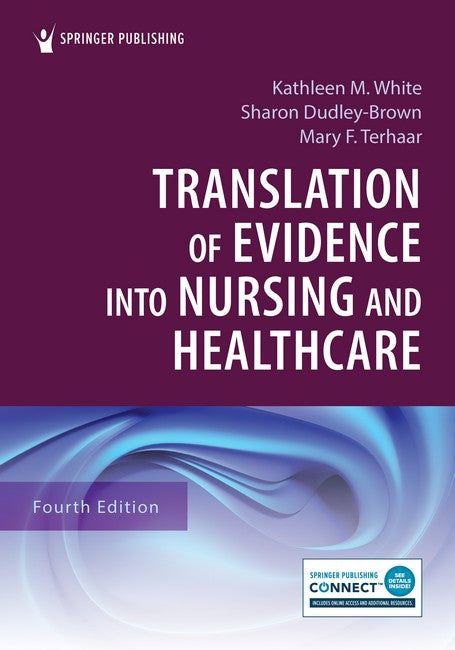Description
Contributors Foreword Preface Acknowledgments Springer Publishing ConnectTM Resources PART I: TRANSLATION OF EVIDENCE Chapter 1. Evidence-Based Practice Chapter 2. The Science of Translation and Major Frameworks Chapter 3. Change Theories for Translation PART II: USE OF TRANSLATION Chapter 4. Translation of Evidence to Improve Clinical Outcomes Chapter 5. Translation of Evidence for Improving Safety and Quality Chapter 6. Translation of Evidence for Leadership Chapter 7. Translation of Evidence for Health Policy PART III: METHODS AND PROCESS FOR TRANSLATION Chapter 8. Methods for Translation Chapter 9. Project Management for Translation Chapter 10. Data Management and Evaluation of Translation PART IV: ENABLERS OF TRANSLATION Chapter 11. Education: An Enabler of Translation Chapter 12. Information Technology: A Foundation for Translation Chapter 13. Teamwork for Translation PART V: BEST PRACTICES IN TRANSLATION Chapter 14. Barriers and Facilitators to Translation Chapter 15. Ethical Responsibilities in the Translation of Evidence and Evaluation of Outcomes Chapter 16. Legal Issues in Translation Chapter 17. Dissemination of Evidence PART VI: TRANSLATION EXEMPLARS Introduction to the Project Exemplars Chapter 18. Acute Care Exemplars Chapter 19. Primary Care Health Exemplars Chapter 20. CRNA Exemplars Chapter 21. Health Systems Exemplars Chapter 22. Team Projects Exemplars Index
Kathleen (Kathi) M. White, PhD, RN, NEA-BC, FAAN, served as director of the MSN (Entry into Nursing), Doctor of Nursing Practice (DNP), and Master's programs at the Johns Hopkins School of Nursing?and coordinated the MSN Health Systems Management Track and the MSN/MBA dual degree option. She continues to hold an adjunct faculty appointment at the Johns Hopkins School of Education, where she teaches in the Masters in Education for the Health Professions program, a collaboration of the Johns Hopkins Schools of Nursing, Medicine, Public Health, Business, and Education. Dr. White is recognized for her leadership in evidence-based practice. She was an original member of the School of Nursing/Johns Hopkins Hospital collaborative team that developed the widely published, award-winning?Johns Hopkins Nursing Evidence-based Practice Model and Guidelines. Dr. White served as a senior adviser to the Center for Health Workforce Analysis, the Division of Nursing, and the Office of Performance Management in the Bureau of Health Professions at the Health Resources and Services Administration from 2010--2013. Her numerous practice leadership roles have included consulting with Parkway Group Healthcare in Singapore and the primary health care reform project in Armenia; as a member of the Hopkins-Healthways Advisory Group; as a member of the Maryland Health Care Commission's Hospital Performance Evaluation Guide Advisory Committee; as chairperson of the American Nursing Association Congress on Nursing Practice and Economics from 2006--2010; as the inaugural chairperson of the Maryland Patient Safety Center's Board of Directors; and as the chairperson of the Johns Hopkins Howard County Medical Center Board of Trustees from 2021--2023 (Board member, 2015--present). Sharon Dudley-Brown, PhD, RN, FNP-BC, FAAN, is a Professor at the University of Delaware. She also holds a faculty appointment at the Johns Hopkins University School of Medicine, where she sees patients as well as conducts research on patients with inflammatory bowel disease. Dr. Dudley-Brown has held several academic appointments, both nationally and internationally, and has worked as a nurse practitioner at several institutions over the past 25+ years. She has published numerous peer-reviewed papers and abstracts in the fields of nursing, inflammatory bowel disease, Crohn's disease, and ulcerative colitis, and is currently a member of several editorial boards, including that of Gastroenterology Nursing, where she is the international editor. She was instrumental in the formation of and is on the Board of Trustees of GHAPP: Gastroenterology and Hepatology Advanced Practice Providers, an organization dedicated to the education of APPs in gastroenterology and hepatology. Mary F. Terhaar, PhD, RN, ANEF, FAAN, is Associate Dean for Graduate Programs at the Fitzpatrick College of Nursing at Villanova University. She is a respected leader in translation, education, and team collaboration. Across 40 years of leadership spanning diverse systems, roles, and clinical services; she has framed problems as challenges, built high-functioning teams with diverse talents, and led development and execution of replicable solutions. Dr. Terhaar has authored or co-authored more than 70 manuscripts and chapters, as well as two broadly adopted texts on translation, evaluation, and DNP education. She is sought as a consultant on curriculum design and continuous improvement in nursing education and provides support to programs working to deliver high impact, rigorous education. She is an active site visitor and team leader for the Commission on Collegiate Nursing Education. Dr. Terhaar has advanced DNP education by creating processes, curricula, and resources which guide faculty and students across the nation and in five countries to produce outcomes. The pioneering work of teams she has led provides guidance for IRB submission, scholarly writing, data management, translation, multiple significant practice challenges, and now entry and success in doctoral education for nurses on the rise. All are increasingly included in curricula which prepare graduates to meet the Quadruple Aim. Dr. Terhaar has led a series of programs to increase diversity in the workforce by increasing diversity in graduate and undergraduate education. Most recently, she developed and lead an innovative program to increase diversity and belonging among undergraduate nursing students in collaboration with the Independence Blue Cross Foundation, and North Philadelphia high schools. Dr. Terhaar is co-founder of an innovative program that helps prospective students remove barriers to entering doctoral study, which has increased successful applications across diverse groups of nurses. She also developed a post-doctoral program for DNPs which increased dissemination, socialization, collaboration, and impact. She has helped to increase the caliber and rigor of scholarship produced by DNPs, appropriate submissions to IRBs, reliability of data and means testing, successful publications, and outcomes from DNP projects.

